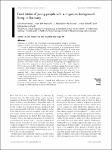Food intake of young people with a migration background living in Germany
Kleiser, Christina
Mensink, Gert
Neuhauser, Hannelore
Schenk, Liane
Kurth, Bärbel-Maria
Objective: To explore the food intake of young migrants living in Germany. Design: Children and adolescents aged 0 to 17 years living in Germany, including 17?1% with a migration background, were examined in a representative health survey. Food frequency data of 7186 boys and 6919 girls, aged 3 to 17 years, were analysed separately for Turkish, Russian Germans, other migrants and nonmigrants. Daily food intake was calculated and a healthy diet score was used to allow an overall interpretation of the diet. Using stepwise linear regression, the association between migrant status and healthy diet score was analysed. Results: Turkish participants (4?8%) consumed significantly more soft drinks, fried potatoes, chocolate cream and snacks than all other groups and significantly less meat than other migrants and non-migrants. Turkish as well as other migrants (8?8%) ate more poultry, fish and pasta/rice, and less sausage/bacon and cooked potatoes, than Russian Germans and non-migrants. Russian Germans (3?5%) consumed less cooked vegetables than non-migrants and other migrants. Nonmigrants had a better mean dietary score than Russian Germans and other migrants. A less preferable diet score was associated with higher age, male sex, being a migrant from Russia, low or middle socio-economic status, and living in rural or provincial areas. Conclusions: The study showed considerable differences in dietary habits between young persons of different origin. This underlines the importance of focusing on ethnic groups in dietary interventions.
No license information

